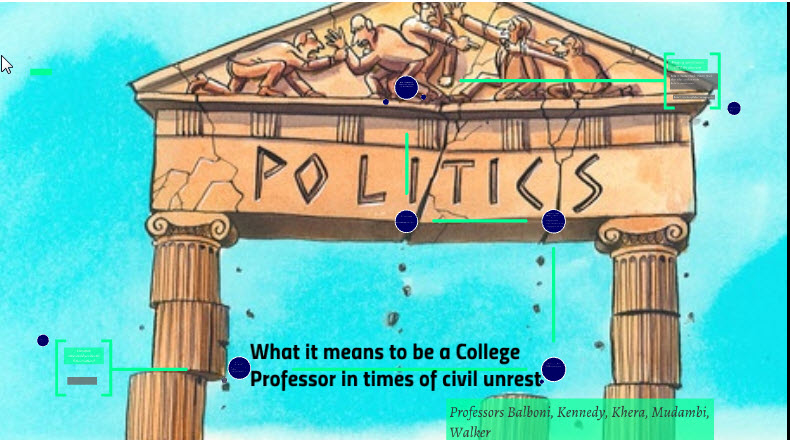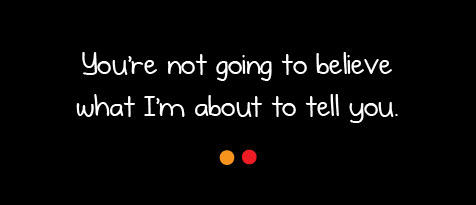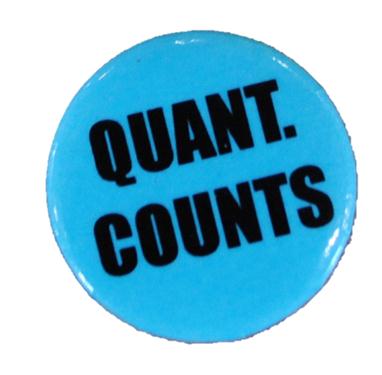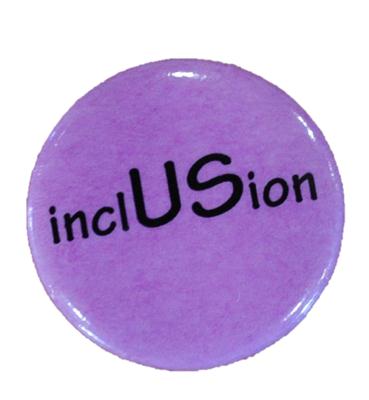 Programs - September 2017
Programs - September 2017 WHAT DO I DO NOW? Series - held 9/25/17 What it Means to be a Faculty Member in Times of Civil Unrest-Jen Balboni, Anjana Mudambi, Mia Khera, Amanda Kennedy, Sandra O'Neil, Stephanie Walker
A discussion on what it means to be a faculty member in times of civil unrest. Many of us have discussed how this past year's political tumult (in the larger community) has spilled into our classrooms. As faculty members, we have been confronted with difficult discussions about the role of law and politics in our society. How do we engage these conversations in ways that are both respectful and provocative for our students? We explores how far we can (or should) we go in the classrooms with our own political perspectives, and how we engage/support students who may be feeling vulnerable due to recent political decisions. In addition, we explored how to engage students who may be on the opposite side of the political spectrum--or who are in the "middle"-- so that they actually listen (instead just tuning out).
Click the link below to view the Prezi: What it Means to be a Faculty Member in Times of Civil Unrest
Click the link below to view a comic strip to get students thinking about why they may be resistant to learning certain information: You're not going to believe what I'm about to tell you This is particularly useful in priming them for hot topic conversations that may provoke emotional reactions or defensiveness. It is the first reading I give in the semester, and we will return to it when we get to controversial topics, like big units on racism, sexism, classism, and homophobia, which tend to get political. It provides a shared language for us in the classroom to understand why we react to certain facts differently than we do to others, and how to be reflexive in those moments. It would be good to note that the comic contains foul language but there is a link at the top for those who want a ‘classroom friendly' version.
 Curriculum Innovation Communities
Curriculum Innovation Communities Curriculum Innovation Communities, an adaptation of "Faculty Learning Community" and "Community of Inquiry" methodologies. Based on over 20 years of research and practice, Curriculum Innovation Communities (CICs) provide a collegial context for cross-disciplinary faculty leadership and innovation on shared curricular challenges. CICs share the following characteristics:
Faculty Curriculum Fellows - Each Fellow facilitates a Curriculum Innovation Community, working with the group to develop, articulate and achieve outcomes; select and make available readings, guest speakers, and other resources; consult on projects and pilots planned by the members; and take the lead on coordinating group products. |  Past Faculty Center programs and workshops
Past Faculty Center programs and workshops Researcher's Lunches: these can be presentations on works in progress, drafts of upcoming conference papers, get feedback on a class activity or lecture, share new pedagogical ideas with peers, demo new tools, be inspired, glean practical ideas, and more Provocative Texts: this is series of informal talk sessions that open up dialogues around stimulating ideas related to teaching and learning. From grand theory and speculation about the current status and future of higher education, to consideration of what we do, "on the ground" with students. Provocative Texts are designed to get the blood flowing, and get us thinking in new and often unconventional ways about teaching and learning. Tricks of the Trade (TotT): these forums showcase great ideas, new and old, that bring home specific strategies we use in and out of the classroom, with passionate teachers from a variety of disciplines. In a nutshell, the TotT mission is to locate best-practices in teaching and learning – those hidden gems around campus and around the world that can be used to enhance our collective work as pedagogists. (CART) Roundtable: a roundtable series that showcases some of the creative and scholarly activity taking place across campus.
 2012-13 Curriculum Innovation Communities
2012-13 Curriculum Innovation Communities Global Interdependence Faculty Fellow & Facilitator: Brecken Chinn Swartz Curry College is interested in increasing international and global connections through the curriculum, as well as through new ways to foster contact between people of differing cultural, linguistic, and national backgrounds. Supporting and advancing this work, the Global Interdependence CIC will bring together faculty and key staff across departments, disciplines, and offices to more deeply consider objectives and methods for Curry. The group will engage with readings and guests, as well as each other, on topics such as 1) international/global course offerings, 2) support for international students and visitors to the Curry campus, 3) study abroad, and 4) foreign language instruction. Individual members will have an opportunity to apply new learning about global interdependence in their own teaching, scholarship, and home departments, with the support of the community. As a community, we will work together to articulate ways that Curry can both extend and deepen its effectiveness in educating informed citizens prepared to engage meaningfully within our increasingly globalizing world community. Bring your global perspectives to this local community—we are going to make a difference at Curry College! Information Literacy Faculty Fellow & Facilitator: Ed Tallent As information based in traditional media formats continues to blend with newer, more diverse digital forms, and as Curry College travels down the path toward a revised General Education curriculum, the opportunity is ripe to form a multi-disciplinary community on information literacy—an aspect of the College experience that touches all of our diverse academic programs and an important element of life-long learning. The Information Literacy CIC will examine the research and literature on effective integration of content and skills, changes in national standards, learning outcomes assessment, and the interaction of learning styles with information literacy. Individual CIC members will gain immediately applicable ideas and practices, which they can apply in their courses and home departments with feedback and discussion from the community. As a community, we will work to develop recommendations and learning modules to further the goal of effective information literacy components in the curriculum at Curry College. Look forward to a wild ride—information literacy is more than you might think! Integrative Learning & Authentic Assessment Faculty Fellow & Facilitator: Carrie Cokely We have been hearing a lot about "integrative learning" and "authentic assessment" using ePortfolios, and Curry College already has both interested dabblers and experienced early adopters already innovating in this area. This CIC will bring together a vibrant, interdisciplinary group of explorers to try out some current practices and investigate new ways in which ePortfolios can support integrative learning and authentic assessment, for both curricular and co-curricular student experiences. The community will engage in readings and dialogue related to best practices, while also having time in the "lab" (together and individually) to experiment with ways to use ePortfolios effectively in existing courses. Guest speakers and mentors—ranging from local practitioners, to national experts—are an exciting possibility that the group can pursue according to their interest and discoveries. Additionally, the community will work towards creating ePortfolio learning outcomes for the campus and a multidisciplinary ePortfolio pilot that could be implemented in Spring 2013. Get ready to integrate teaching, learning, and assessment innovations with existing and emerging technologies in this authentic community! On December 11, the 2012-13 Curriculum Innovation Communities gathered to share and celebrate mid-year progress. We invite you to explore:Take-away IdeasComplete Presentation
 2011-12 Curriculum Innovation Communities
2011-12 Curriculum Innovation Communities Please find below information from each of our inaugural Curriculum Innovation Communities including readings, recommendations, proposals, and other documents and links. Diversity in the Curriculum, Facilitated by Prof. Melissa Anyiwo
Writing Across Curry, Facilitated by Prof. Gabrielle Regney
Quantitative Literacy, Facilitated by Prof. Rebecca Vessenes
On December 13, the 2011-12 Curriculum Innovation Communities gathered to share and celebrate mid-year progress. We invite you to explore:Take-away IdeasComplete Presentation
|




